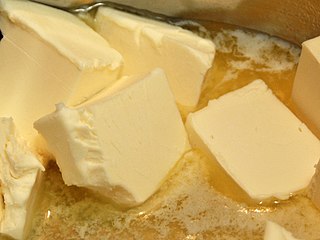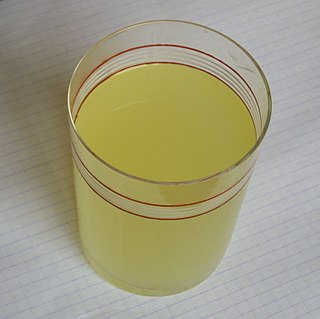Related Research Articles

Cream is a dairy product composed of the higher-fat layer skimmed from the top of milk before homogenization. In un-homogenized milk, the fat, which is less dense, eventually rises to the top. In the industrial production of cream, this process is accelerated by using centrifuges called "separators". In many countries, it is sold in several grades depending on the total butterfat content. It can be dried to a powder for shipment to distant markets, and contains high levels of saturated fat.

Dairy products or milk products, also known as lacticinia, are food products made from milk. The most common dairy animals are cow, water buffalo, nanny goat, and ewe. Dairy products include common grocery store food around the world such as yogurt, cheese, milk and butter. A facility that produces dairy products is a dairy. Dairy products are consumed worldwide to varying degrees. Some people avoid some or all dairy products because of lactose intolerance, veganism, environmental concerns, other health reasons or beliefs.

Nutella is a brand of brown, sweetened hazelnut cocoa spread. Nutella is manufactured by the Italian company Ferrero and was introduced in 1964, although its first iteration dates to 1963.

Butter is a dairy product made from the fat and protein components of churned cream. It is a semi-solid emulsion at room temperature, consisting of approximately 80% butterfat. It is used at room temperature as a spread, melted as a condiment, and used as a fat in baking, sauce-making, pan frying, and other cooking procedures.

Yogurt is a food produced by bacterial fermentation of milk. Fermentation of sugars in the milk by these bacteria produces lactic acid, which acts on milk protein to give yogurt its texture and characteristic tart flavor. Cow's milk is most commonly used to make yogurt. Milk from water buffalo, goats, ewes, mares, camels, and yaks is also used to produce yogurt. The milk used may be homogenized or not. It may be pasteurized or raw. Each type of milk produces substantially different results.

Whey is the liquid remaining after milk has been curdled and strained. It is a byproduct of the manufacturing of cheese or casein and has several commercial uses. Sweet whey is a byproduct resulting from the manufacture of rennet types of hard cheese, like cheddar or Swiss cheese. Acid whey is a byproduct brought out during the making of acid types of dairy products, such as strained yogurt.

Cottage cheese is a curdled milk product with a mild flavour and a creamy, heterogeneous, soupy texture, made from skimmed milk. An essential step in the manufacturing process distinguishing cottage cheese from other fresh cheeses is the addition of a "dressing" to the curd grains, usually cream, which is mainly responsible for the taste of the product. Cottage cheese is not aged.

Buttermilk is a fermented dairy drink. Traditionally, it was the liquid left behind after churning butter out of cultured cream. As most modern butter in Western countries is not made with cultured cream but uncultured sweet cream, most modern buttermilk in Western countries is cultured separately. It is common in warm climates where unrefrigerated milk sours quickly.

Cheez Whiz is a brand of processed cheese sauce or spread produced by Kraft Foods. It was developed by a team led by food scientist Edwin Traisman (1915–2007). It was first sold in 1952, and, with some changes in formulation, continues to be in production today.

Whey protein is a mixture of proteins isolated from whey, the liquid material created as a by-product of cheese production. The proteins consist of α-lactalbumin, β-lactoglobulin, serum albumin and immunoglobulins. Glycomacropeptide also makes up the third largest component but is not a protein. Whey protein is commonly marketed as a protein supplement, and various health claims have been attributed to it. A review published in 2010 in the European Food Safety Authority Journal concluded that the provided literature did not adequately support the proposed claims.

Skyr is a traditional Icelandic cultured dairy product. It has the consistency of strained yogurt, but a milder flavor. Skyr can be classified as a fresh sour milk cheese, similar to curd cheese consumed like a yogurt in the Baltic states, the Low Countries and Germany. It has been a part of Icelandic cuisine for centuries.
Simplesse is a multi-functional dairy ingredient made from whey protein concentrate used as a fat substitute in low-calorie foods. Originally brought to market in 1988, the manufacturer, CP Kelco, sells Simplesse to food processors as a "microparticulated whey protein concentrate" in dry powder form, and recommends that it be labelled as dairy protein on food labels. Older versions of the product also contain egg whites.

Clabber is a type of soured milk. It is produced by allowing unpasteurized milk to turn sour (ferment) at a specific humidity and temperature. Over time, the milk thickens or curdles into a yogurt-like consistency with a strong, sour flavor. In Joy of Cooking, "Clabber... is milk that has soured to the stage of a firm curd but not to a separation of the whey."

Strained yogurt, Greek yogurt, yogurt cheese, sack yogurt or kerned yogurt is yogurt that has been strained to remove most of its whey, resulting in a thicker consistency than normal unstrained yogurt, while still preserving the distinctive sour taste of yogurt. Like many types, strained yogurt is often made from milk enriched by boiling off some water content, or by adding extra butterfat and powdered milk. In Europe and North America, it is often made from low-fat or fat-free cow's milk. In Iceland, a similar product named skyr is made.

A smoothie is a beverage made by puréeing ingredients in a blender. A smoothie commonly has a liquid base, such as fruit juice or milk, yogurt or ice cream. Other ingredients may be added, including fruits, vegetables, non-dairy milk, crushed ice, whey powder or nutritional supplements.

Sodium lactate is the sodium salt of lactic acid, and has a mild saline taste. It is produced by fermentation of a sugar source, such as corn or beets, and then, by neutralizing the resulting lactic acid to create a compound having the formula NaC3H5O3.
Milk protein concentrate (MPC) is any type of concentrated milk product that contains 40–90% milk protein. The United States officially defines MPC as "any complete milk protein concentrate that is 40 percent or more protein by weight." In addition to ultrafiltered milk products, the MPC classification includes concentrates made through other processes, such as blending nonfat dry milk with highly concentrated proteins, such as casein.

Sour cream is a dairy product obtained by fermenting regular cream with certain kinds of lactic acid bacteria. The bacterial culture, which is introduced either deliberately or naturally, sours and thickens the cream. Its name comes from the production of lactic acid by bacterial fermentation, which is called souring. Crème fraîche is one type of sour cream with a high fat content and less sour taste.
First Milk is a dairy cooperative in Britain which manufactures cheese, specialist dairy ingredients and whey proteins for its customers, as well as providing traceable fresh milk to a range of dairy manufacturers and food processors. As a dairy co-operative, owned and run by farmers; the area covered by its milk pool runs from the Mull of Kintyre in Scotland down through England and Wales.

Perfect Day, Inc. is a food technology startup company based in Berkeley, California, that has developed processes of creating dairy proteins, including casein and whey, by fermentation in microbiota, specifically from fungi in bioreactors, instead of extraction from bovine milk.
References
- ↑ Robert T. Marshall; H. Douglas Goff; Richard W. Hartel (2003). Ice Cream. Springer. p. 20. ISBN 978-0-306-47700-3 . Retrieved 27 May 2012.
- ↑ "Modified Milk Ingredients as Calcium source". Canadian Food Inspection Agency. Retrieved 2012-05-27.
- 1 2 "Milking meaning from the ingredients label". CBC News. 2010-09-07. Archived from the original on January 15, 2013. Retrieved 2012-05-27.
- ↑ Pamela Cuthbert (2008-04-02). "May contain more than just milk". Macleans. Archived from the original on 2012-09-06. Retrieved 2012-05-27.